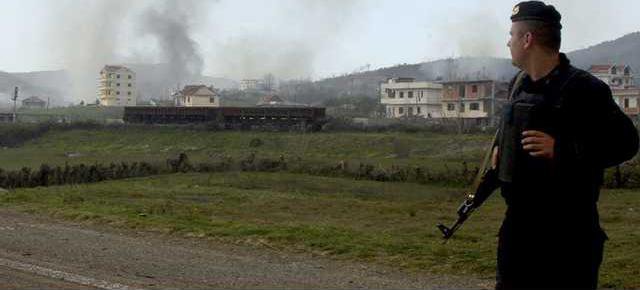TIRANA, Albania - A massive explosion at an Albanian army ammunition dump on Saturday killed at least five people and injured 243, including many children, authorities said.
Footage from Albanian television showed a massive ball of fire shooting up from the site in Gerdec village, about six miles north of the capital, Tirana.
Shrapnel and shell fragments rained down on homes and vehicles, and houses more than a mile away were damaged by the blast. The initial blast set off a series of explosions, and ammunition continued to detonate into the night.
The blast was heard as far away as the Macedonian capital of Skopje, about 120 miles away, and it prompted a brief suspension of flights at Tirana's nearby international airport, which was slightly damaged.
Prime Minister Sali Berisha, who described the blasts as an accident, said during a late-night news conference that the death toll stood at five, but that the number was likely to increase.
He said 243 people had been registered as injured. By Saturday night, 142 remained hospitalized, and 12 of them were in serious condition.
Health Minister Nard Ndoka said earlier that many of the injured were children.
Authorities evacuated 4,000 people from three villages and the surrounding area using armored personnel carriers, Berisha said.
The continuous explosions hampered rescue efforts, though, and authorities were unable to get to the site of the main blast for hours. The explosion also damaged a major electricity transmission point, leaving the area without power, authorities said.
The army depot is used as a location to destroy excess ammunition. Albania has some 100,000 tons of excess ammunition stored in former army depots across the country, according to Defense Minister Fatmir Mediu.
The work was being carried out by an Albanian company that had been subcontracted by a U.S. company based in South Carolina, Berisha said, adding that there had been no foreign citizens in the area.
In the past year, about 6,000 tons to 7,000 tons of ammunition had been destroyed.
Berisha said he did not exclude human error in Saturday's blast, but added that the ammunition could have exploded spontaneously because of its age.
Albin Mecaj, 22, who works at the depot, told The Associated Press by telephone that about 80 people had been working on destroying ammunition at the time of the explosion. Mecaj, who was badly burned in the blast, said about 120 people usually work at the depot.
Accidents have occurred at ammunition dumps in Albania in the past, although Saturday's was by far the worst. Three years ago explosions at army weapon depots in southern Albania killed an army officer and injured four others.
Berisha, a cardiologist, visited victims in hospitals in Tirana and said most of the injured were suffering from burns and psychological shock.
The health minister said Albania had received offers of assistance from Italy, Greece, Switzerland and many other countries to treat the injured. Berisha said some of the more seriously injured might be airlifted to one of those countries.
Italy was sending a plane carrying medical personnel and equipment in response to an Albanian request. France and the United States also have offered help and support.
In neighboring Kosovo, where most of the population is ethnic Albanian, hundreds of people lined up at a Pristina hospital to give blood, and NATO-led peacekeepers were sending blood reserves by helicopters, officials said.
Macedonians in Skopje also donated blood and Macedonian Foreign Minister Antonio Milososki flew to Tirana to offer assistance and donated blood himself.

